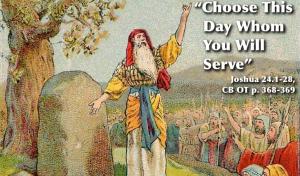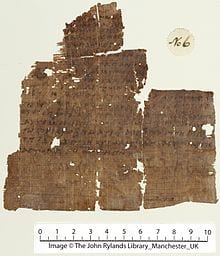
Among my crowd of acquaintances and friends are some Pagans. Present-day Pagans believe in a number of gods and goddesses, but I do not think they hold the cyclical worldview that lay under ancient Pagan beliefs, a world that depends on always going back to a sacred beginning, never forward to something new.. Between ancient Pagans and the modern world came the Jews, who could not long abide the thought of a world going nowhere. The take on reality that they developed has determined much of our modern consciousness, whether we follow them religiously or not.
This is the seventh in a series on the Creed of Christians. An introduction consists of my retelling of the Creed’s story. That and links to other posts in the series are here.
A people known first as Hebrews or Israelites and later as Jews came together as an identifiable unit probably in the 1200’s Before the Common Era (BCE). It was a remarkable process, though most probably without the miracles of the Bible’s Exodus story. Among the studies on which this account is based is William G. Dever’s Who were the Early Israelites and Where did they Come From?
The people who became the Jews get started.
The world to the East and Southeast of the Mediterranean Sea was in chaos. There had been a repressive kind of order, as usual in complex human societies. People on the bottom, the peasant farmers lived in villages and tended the fields mostly for the benefit of the rulers and elite in nearby larger cities. But the system was breaking down. Highwaymen (called “hapiru,” a name suggestively similar to “Hebrew”) were operating freely outside the law, disrupting the extensive trading network that had kept the system going. Petty kings wrote to Egypt for help, but Egypt, with troubles of its own, was not prepared to help.
Then comes one of history’s mysteries. Maybe some of the hapiru took the lead. People started leaving their settled villages, headed for the hinterlands, the highlands of Palestine, and took up a less culturally advanced, less politically complicated way of life. There were no kings at first. They did what they knew; they farmed. Perhaps they were joined by some runaway slaves from Egypt.
This movement probably happened more peacefully and slowly than what the Bible seems to say, but that doesn’t mean that the stories people told about their heritage had to be dull. There was enough conflict and danger in this chaotic beginning. It would not be at all surprising if tales of a mighty, liberating, warrior god told by a group of runaway slaves came to represent the experience of this whole loosely connected community.
Israel’s god requires exclusive worship.
What would the people think about such a god? Not necessarily that this was the only god there was, but certainly they envisioned themselves as special to this one god. They could trust this one, and they ought to be faithful to this one. Vision, trust, and faithfulness are the three meanings of faith out of which faith as belief statements arises. Here are two great statements of early Israelite faith:
- I, the LORD, am your God, who brought you out of the Land of Egypt, that place of slavery. You shall not have other gods besides me. (Deuteronomy 5:6-7)
- [C]hoose this day whom you will serve, whether the gods your ancestors served in the region beyond the River or the gods of the Amorites in whose land you are living; but as for me and my household, we will serve the Lord. (Joshua 24:15)
Neither of these says that other gods don’t exist. In fact, the second presumes that they do exist. Were the precursors of the Jews simply adding another god to the world’s religions? They were doing much more than that. The first signal of the uniqueness of this new people is their insistence on not worshiping other gods. Jewish worship of only one god is called monolatry. It’s not monotheism but a step toward it. I don’t know of any religion not descended from Judaism that is similarly ill-disposed to its adherents’ worshiping someone else’s god.
God of history versus gods of nature
Israel’s God, Yahweh, had become something other than a nature god. If your god is represented by the sun, there’s nothing to stop you from worshiping a god of the moon as well if you see other people doing that. In general, nature gods move easily from one culture to another, especially when one country conquers another. But if your god is the one who took you out of one nation and set you down in the midst of some other nations and kept you more or less safe all the while, then any political conflict with a neighbor is going to seem like a religious conflict as well. Israel’s god may have started out as a nature god but became a god of Israel’s history.
For Israelites to serve another god would be to deny their identity as Israelites. It would also be to abandon the story that made them who they were, the story of a world where new things, like the dawn of a people with something new to offer the world, can happen.
More about the god of history in the next post in this series.
Image credit: Slideshare via Google Images












